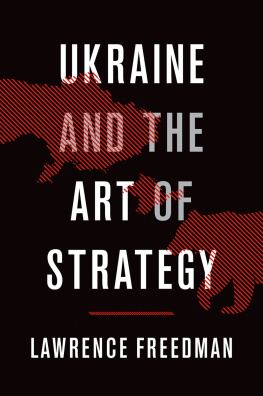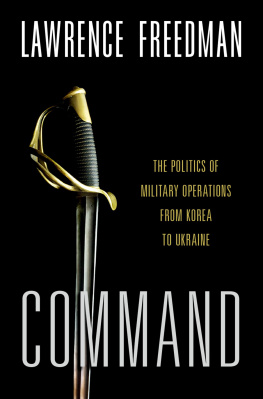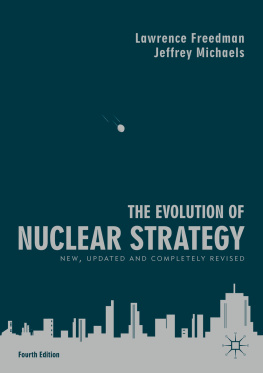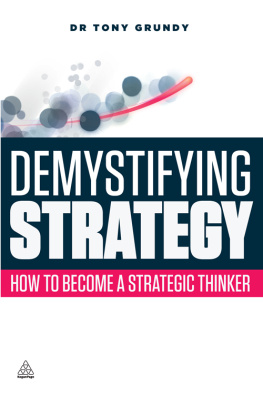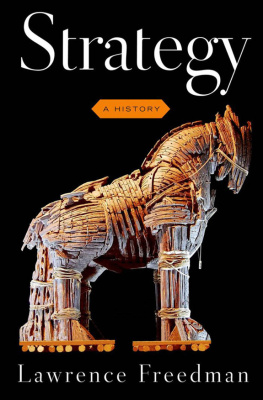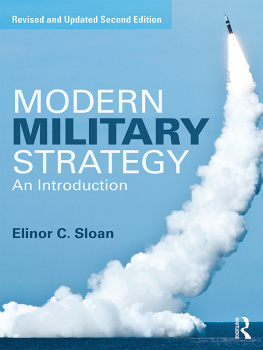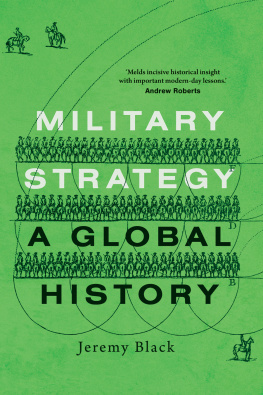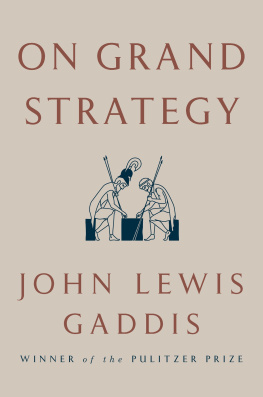Strategy
Strategy
A History
LAWRENCE
FREEDMAN


Oxford University Press is a department of the University of Oxford. It furthers the Universitys objective of excellence in research, scholarship, and education by publishing worldwide.
Oxford New York
Auckland Cape Town Dar es Salaam Hong Kong Karachi Kuala Lumpur Madrid Melbourne Mexico City Nairobi New Delhi Shanghai Taipei Toronto
With offices in
Argentina Austria Brazil Chile Czech Republic France Greece Guatemala Hungary Italy Japan Poland Portugal Singapore South Korea Switzerland Thailand Turkey Ukraine Vietnam
Oxford is a registered trademark of Oxford University Press in the UK and certain other countries.
Published in the United States of America by
Oxford University Press
198 Madison Avenue, New York, NY 10016
Lawrence Freedman 2013
All rights reserved. No part of this publication may be reproduced, stored in a retrieval system, or transmitted, in any form or by any means, without the prior permission in writing of Oxford University Press, or as expressly permitted by law, by license, or under terms agreed with the appropriate reproduction rights organization. Inquiries concerning reproduction outside the scope of the above should be sent to the Rights Department, Oxford University Press, at the address above.
You must not circulate this work in any other form and you must impose this same condition on any acquirer.
Library of Congress Cataloging-in-Publication Data
Freedman, Lawrence.
Strategy: a history / Lawrence Freedman.
pages cm
Includes bibliographical references and index.
ISBN 9780199325153 (hardback)
1. StrategyHistory. 2. Military history. 3. Strategic culture. 4. Strategic planning. I. Title.
U162.F86 2013
320.6dc23
2013011944
9 8 7 6 5 4 3 2 1
Printed in the United States of America
on acid-free paper
For Judith
CONTENTS
Everyone has a plan till they get punched in the mouth.
Mike Tyson
E VERYONE NEEDS a strategy. Leaders of armies, major corporations, and political parties have long been expected to have strategies, but now no serious organization could imagine being without one. Despite the problems of finding ways through the uncertainty and confusion of human affairs, a strategic approach is still considered to be preferable to one that is merely tactical, let alone random. Having a strategy suggests an ability to look up from the short term and the trivial to view the long term and the essential, to address causes rather than symptoms, to see woods rather than trees. Without a strategy, facing up to any problem or striving for any objective would be considered negligent. Certainly no military campaign, company investment, or government initiative is likely to receiving backing unless there is a strategy to evaluate. If a decision can be described as strategically significant, then it is obviously more important than decisions of a more routine nature. By extension, people making such decisions are more important than those who only offer advice or are tasked with implementation.
Strategies are now offered not only for the life-or-death, make-or-break decisions of great states and large corporations but also for more mundane matters. There is a call for a strategy every time the path to a given destination is not straightforward or whenever judgments are required on resources needed, their effective application, and their appropriate sequence. In business, chief executives may take responsibility for overall strategy, but there are separate strategies for procurement, marketing, human resources, and so on. Doctors have clinical strategies, lawyers have prosecution strategies, and social workers have counseling strategies. Individuals have their own strategiesfor developing a career, coping with bereavement, filling in tax returns, or even potty-training an infant or buying a car. In fact, there is now no human activity so lowly, banal, or intimate that it can reasonably be deprived of a strategy.
For those who want more effective strategies, there are plenty of books offering advice. The multiplicity of audiences shows in the variations of style. Some books rely on a jokey presentation, others on large print or inspirational stories from the successful and victorious. There are learned tomes with graphs and charts detailing many complicated factors to be taken into account. Somewhere between are checklists of activities that, if followed carefully, will at least increase the chances of achieving the right result. There are extended pep talks, encouraging bold thinking and decisive moves and a commitment to victory. These may be no more than collections of clichs, not always consistent, with hints on how to struggle with opponents and bring along prospective allies. Elsewhere there are more philosophical reflections on the paradoxes of conflict and the pitfalls of losing flexibility in the single-minded pursuit of a distant goal. There are even tips on how to be a fantasy strategist while staring at a screen, refighting ancient wars or dominating aliens in imagined universes with complicated rules and extraordinary weapons.
Can the same word apply to battle plans, political campaigning, and business dealsnot to mention means of coping with the stresses of everyday lifewithout becoming meaningless? Columnist Matthew Parris has lamented the ubiquity of the word strategy and the ease with which it becomes attached to any desirable end. He commented on demands for a growth strategy in the face of a stagnant and indebted economy but wondered who would claim a rain strategy as an answer to drought. Every sinner needs a virtue strategy. Every starveling needs a food strategy. There exist few modern circumstances, he observed, where the removal of the word strategy from any passage containing it fails to clarify matters, usually demonstrating the arguments circularity.not much different from other related words, such as power and politics. While their exact meanings are explored, rarely to a conclusion, in scholarly texts, their adoption in everyday speech tends to be imprecise, loose, and lazy.
There is no agreed-upon definition of strategy that describes the field and limits its boundaries. One common contemporary definition describes it as being about maintaining a balance between ends, ways, and means; about identifying objectives; and about the resources and methods available for meeting such objectives. This balance requires not only finding out how to achieve desired ends but also adjusting ends so that realistic ways can be found to meet them by available means. This process can describe the simplest tasks, but when the ends are easily reached, when inanimate objects rather than other people are involved, and when very little is at stake, this barely counts as strategy. By and large, strategy comes into play where there is actual or potential conflict, when interests collide and forms of resolution are required. This is why a strategy is much more than a plan. A plan supposes a sequence of events that allows one to move with confidence from one state of affairs to another. Strategy is required when others might frustrate ones plans because they have different and possibly opposing interests and concerns. The conflicts can be quite mild, for example, between those within the same organization notionally pursuing the same goals but with distinctive responsibilities. As the quote from boxer Mike Tyson illustrates, a well-aimed blow can thwart the cleverest plan. The inherent unpredictability of human affairs, due to chance events as well as the efforts of opponents and the missteps of friends, provides strategy with its challenge and drama. Strategy is often expected to start with a description of a desired end state, but in practice there is rarely an orderly movement to goals set in advance. Instead, the process evolves through a series of states, each one not quite what was anticipated or hoped for, requiring a reappraisal and modification of the original strategy, including ultimate objectives. The picture of strategy that should emerge from this book is one that is fluid and flexible, governed by the starting point and not the end point.
Next page

